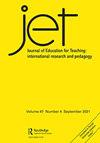21世纪的教学:变化、挑战和机遇
IF 1.7
3区 教育学
Q2 EDUCATION & EDUCATIONAL RESEARCH
引用次数: 0
摘要
正如JET在过去半个世纪中所记录的那样,学习和继续学习教学已经发展得面目全非。本期JET中的每篇文章都从不同的角度对这一演进过程做出了贡献。克罗地亚萨格勒布大学(University of Zagreb)的蒂亚•帕文•伊凡内克(Tia Pavin Ivanec)在第一篇论文中关注的是教学可能是一种职业选择这一新生想法,她研究了激励该国未来教师(早年、小学和中学)的因素。重要的是,所有小组都证明了教学的内在价值(对教育的热情;对青年人的生活产生积极影响;产生影响的;个人成长和发展机会等);教学的社会价值(工作保障);工作与生活的平衡;有竞争力的薪水/福利等)以及对自己能力的积极认知是最重要的激励因素。从数据分析中得出的各组之间有趣的差异证实了这样一种观点,即二级考生更强烈地受到对其专业的热爱的激励。在C21时代,强烈的教学动机与正式教育开始以来一样重要。然而,正如接下来的文章所揭示的那样,当代生活中复杂而多方面的挑战正对教师教育的各个方面产生直接影响。与职业动机密切相关的是职业身份形成的概念,这是苏格兰爱丁堡大学的达里奥·巴内加斯下一篇文章的重点。Banegas通过对TESOL课程中语言课程开发模块的深入评估,得出了学生教师专业身份形成的重要方面:反思性实践者和作为研究者和课程开发者的语言教师。值得注意的是,本文证明了这些特征的发展对于增强专业认同感非常重要,这反过来又增加了学生教师对其最初的教师教育课程和未来职业生涯的投入,并增强了他们在工作中的目的感和意义感。本期的下一篇文章,来自中国三所大学的葛伟及其同事,描述了一项基于扩张性学习框架的研究,该研究是从文化史活动理论发展而来的(Engstrom 2001)。扩张性学习不仅是一个获取知识和技能的认知过程,也是一个改变学习发生的社会和文化背景的积极过程。Wei等人通过扩张性学习的视角考察了他们初始教师教育计划的不同方面,使用形成性干预来辨别实践教学知识的各个方面是如何以及何时获得的。这种细粒度的分类表明,当实习教师从事具有挑战性的、新颖的活动时,实践教学知识获取的增长轨迹就会发生,这些活动要求他们解决问题,发展新技能,并与他们的社会和文化互动。3,351 - 354 https://doi.org/10.1080/02607476.2023.2212453本文章由计算机程序翻译,如有差异,请以英文原文为准。
Learning to teach in the twenty-first century: change, challenge and chance
As recorded in the volumes of JET for the last half century, learning, and continuing to learn to teach has developed out of recognition. The articles in this issue of JET each contribute to this evolutionary process from a range of perspectives. The nascent idea that teaching might be a career choice is the focus of the first paper, by Tia Pavin Ivanec, from the University of Zagreb in Croatia, who looked at factors that motived prospective teachers (early years, primary and secondary) in that country. Importantly, all groups evinced the intrinsic value of teaching (passion for education; having a positive impact on young people’s lives; making a difference; personal growth and development opportunities, etc.); the social value of teaching (job security; work-life balance; competitive salary/ benefits, etc.) and a positive perception of their own abilities as the most important motivators. Interesting differences between the groups arising from the data analysis substantiate the view that secondary candidates are more strongly motivated by a love of their subject. A strong motivation for teaching remains as important in the C21 as it has been since formal education began. However, as will unfold in the articles to come, the complex and multifaceted challenges of contemporary life are having a direct impact on all aspects of teacher education. Closely linked to career motivation is the concept of professional identity formation, which is the focus of the next article, by Dario Banegas of the University of Edinburgh in Scotland. Drawing on an in-depth evaluation of a language curriculum development module in a TESOL course, Banegas elicited important aspects of the development of the formation student teachers’ professional identities: that of the reflective practitioner and the language teacher as a researcher and curriculum developer. Significantly, this paper demonstrates that the development of these characteristics is important in reinforcing a sense of professional identity, which in turn increases student teachers’ investment in their initial teacher education course and their future career as well as enhancing a greater sense of purpose and meaning in their work. The next article in this issue, from Ge Wei and colleagues from three universities in China, describes a study situated within the framework of expansive learning, developed from cultural-historical activity theory (Engstrom 2001). Not merely a cognitive process of acquiring knowledge and skills, expansive learning is also an active process of transforming the social and cultural contexts in which learning takes place. Wei et al. examined different aspects of their initial teacher education programme through the lens of expansive learning using formative interventions to discern how and when various aspects of practical teaching knowledge were gained. This fine-grained taxonomy demonstrated that the trajectory of growth in practical teaching knowledge acquisition occurs when the student teachers engaged in challenging, novel activities that required them to solve problems, develop new skills and interact with their social and cultural JOURNAL OF EDUCATION FOR TEACHING 2023, VOL. 49, NO. 3, 351–354 https://doi.org/10.1080/02607476.2023.2212453
求助全文
通过发布文献求助,成功后即可免费获取论文全文。
去求助
来源期刊

Journal of Education for Teaching
EDUCATION & EDUCATIONAL RESEARCH-
CiteScore
10.50
自引率
10.00%
发文量
61
期刊介绍:
The Journal of Education for Teaching is an established international refereed periodical which publishes original contributions on the subject of teacher education. The journal interprets "teacher education" in the widest sense, to include initial training, in-service education and staff development. The editors welcome scholarly discussions of new issues, reports of research projects or surveys of research work in particular fields, and contributions to current debates in teacher education throughout the world, generally or on specific issues.
 求助内容:
求助内容: 应助结果提醒方式:
应助结果提醒方式:


